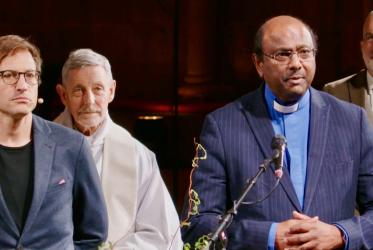The Ecumenical Panel on a New International Financial and Economic Architecture has concluded its second meeting in Switzerland, developing advocacy strategies for churches to ensure economic justice and the ecological wellbeing of the communities they serve.
The panel, comprised of economic experts and theologians, met from 15 to 17 January at the Ecumenical Institute in Bossey, identifying discrepancies within global economic and financial structures that generate adverse impact on communities, urging churches to influence states and financial institutions in realizing ethical and just systems.
The Ecumenical Panel on a New International Financial and Economic Architecture was established last year by the World Council of Churches (WCC), the World Communion of Reformed Churches (WCRC), the Lutheran World Federation (LWF) and the Council for World Mission (CWM) as a follow-up to the São Paulo conference on a New Financial and Economic Architecture held by these four ecumenical organizations in 2012.
At the meeting, the panel addressed a wide range of issues including public finance and debt, regulation of the financial sector and global economic governance.
“The panel’s work is aimed at helping churches to implement the São Paulo statement, a document jointly produced by the WCC, WCRC and CWM in Brazil in November 2012,” said Dr Rogate Mshana, the WCC programme executive for Poverty, Wealth and Ecology, who had convened the panel.
The statement advocates for policy and structural changes ensuring social inclusion, gender justice and care for the environment while promoting an “economy of life”.
“The financial sector has brought down the world economy,” said Dr Barry Herman, a panellist from the United States. He explained that financial services essential to the functioning of the world economies must operate with less risk.
In a situation where “financial exploitation is universal”, Herman added that “churches can be an important voice in mobilizing public opinion and pressurizing the governments to take steps avoiding negative effects on the wellbeing of people and communities.”
The panel also worked on finalizing a detailed report developing a coherent strategy for the churches to work for a “new financial and economic architecture”. The report will be making recommendations to churches on how to implement the São Paulo statement, strengthening their work and people’s movements for economic justice.
Omega Bula, a panellist from Zambia, called the report “an achievement of the panel,” which she said is “strongly rooted in Christian theology of promoting an economy of life”.
Bula added that “these Christian principles guide our work especially in the area of public finance, where several practices need to be changed in order to achieve a just global economic system.”
Rev. Dr Olav Fykse Tveit, the WCC general secretary, Rev. Dr Setri Nyomi, the WCRC general secretary, Rev. Martin Junge, the LWF general secretary and Rev. Dr Collin I. Cowan, the CWM general secretary, attended the meeting, expressing appreciation for the work done by the panel.
Ecumenical panel on a new financial and economic architecture (WCC news release of 29 August 2013)
São Paulo Statement: International Financial Transformation for the Economy of Life





